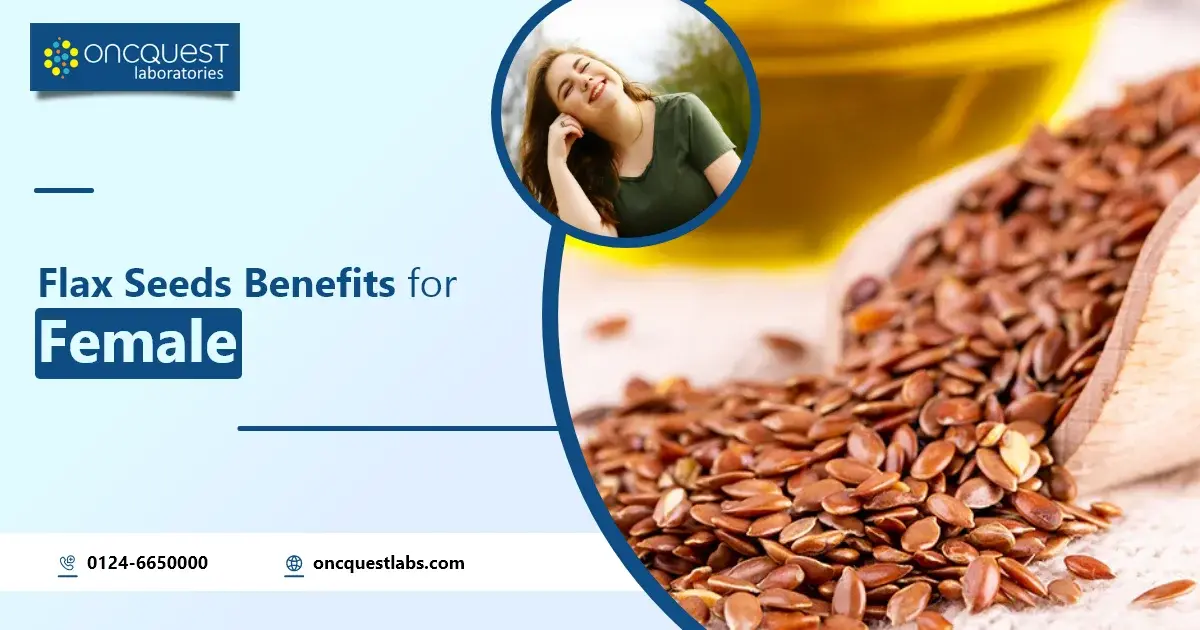Flax seeds, derived from the flax plant (Linum usitatissimum), have garnered attention worldwide for their exceptional nutritional profile and health-promoting properties. Historically valued for their versatility in culinary and medicinal practices, flax seeds are renowned as a potent source of essential nutrients beneficial for overall well-being, particularly for women. Rich in omega-3 fatty acids, lignans, fiber, and a spectrum of vitamins and minerals, flax seeds offer a myriad of health benefits that specifically cater to the unique needs of women. From supporting hormonal balance and heart health to enhancing skin radiance and aiding in weight management, flax seeds serve as a versatile addition to modern diets, promoting both preventive health measures and therapeutic benefits.
Contents
- 1 Nutrition Value of Flax Seeds
- 2 Benefits of Flax Seeds For Females
- 2.1 Regulates menstrual cycles.
- 2.2 Supports hormone balance during menopause
- 2.3 Reduces triglycerides in the blood
- 2.4 Enhances bone density with calcium, magnesium, and phosphorus.
- 2.5 Prevents osteoporosis and bone fractures.
- 2.6 Improves skin elasticity and reduces wrinkles
- 2.7 Helps maintain a healthy weight during pregnancy and postpartum
- 2.8 Supports brain health with omega-3 fatty acids
- 2.9 Supports breast health post-breast cancer treatment
- 2.10 Supports lactation and breast milk production
- 2.11 Treats fungal infections like candida
- 2.12 Aids in muscle building and strength training
- 3 Flax Seeds Side Effects for Female
- 4 Flax Seeds Benefits for Female Weight Loss
- 5 Flax Seeds Benefits for Female Weight Gain
- 6 Conclusion:
- 7 FAQ:
Nutrition Value of Flax Seeds
| Nutrient | Amount per 1 tbsp (10g) |
| Calories | 55 |
| Total Fat | 4.3 grams |
| – Saturated Fat | 0.4 grams |
| – Monounsaturated Fat | 0.8 grams |
| – Polyunsaturated Fat | 2.9 grams |
| Omega-3 (ALA) | 2.5 grams |
| Omega-6 | 0.7 grams |
| Total Carbohydrate | 3 grams |
| – Dietary Fiber | 2.8 grams |
| – Sugars | 0.2 grams |
| Protein | 1.9 grams |
| Calcium | 26 milligrams |
| Iron | 0.5 milligrams |
| Magnesium | 27 milligrams |
| Phosphorus | 42 milligrams |
| Potassium | 60 milligrams |
| Zinc | 0.4 milligrams |
Note: Nutrient values are approximate and can vary based on factors like seed variety and processing methods. Flax seeds are also available ground, which can affect nutritional content slightly. Including flax seeds in your diet provides a rich source of essential fatty acids, fiber, and minerals, supporting overall health and well-being
Benefits of Flax Seeds For Females
Regulates menstrual cycles.
Flax seeds are known to help regulate menstrual cycles due to their high content of lignans, a type of phytoestrogen. Lignans have been shown to balance estrogen levels in the body, potentially alleviating irregularities in menstrual cycles such as missed periods or heavy bleeding. By supporting hormonal balance, flax seeds may promote regularity in menstrual cycles, providing relief from symptoms associated with hormonal fluctuations. Incorporating flax seeds into the diet can be beneficial for women seeking natural ways to manage menstrual health and promote overall well-being.
Supports hormone balance during menopause
Flax seeds support hormone balance during menopause primarily through their lignan content, which acts as a phytoestrogen in the body. Phytoestrogens mimic estrogen’s effects, helping to alleviate symptoms like hot flashes, night sweats, and mood swings. By modulating estrogen levels, flax seeds may promote hormonal stability, reducing the intensity and frequency of menopausal symptoms. Additionally, the omega-3 fatty acids in flax seeds contribute to overall hormonal health by reducing inflammation and supporting cardiovascular function, which is crucial during the hormonal changes of menopause. Integrating flax seeds into daily meals can aid in managing menopausal symptoms effectively.
Reduces triglycerides in the blood
Flax seeds are effective in reducing triglycerides in the blood, thanks to their high content of alpha-linolenic acid (ALA), an omega-3 fatty acid. ALA helps lower triglyceride levels by improving lipid metabolism and reducing the liver’s production of triglycerides. Studies have shown that regular consumption of flax seeds can lead to significant reductions in blood triglyceride levels, which is beneficial for cardiovascular health. Incorporating flax seeds into the diet, whether in ground form or as oil, provides a natural and potent way to support heart health and manage lipid profiles.
Enhances bone density with calcium, magnesium, and phosphorus.
Flax seeds contribute to enhanced bone density primarily due to their rich content of essential minerals such as calcium, magnesium, and phosphorus. These minerals play crucial roles in maintaining bone strength and integrity. Calcium is essential for bone structure, while magnesium aids in calcium absorption and bone formation. Phosphorus supports the structural component of bones and teeth. By incorporating flax seeds into the diet, individuals can supplement these vital minerals, promoting bone health and potentially reducing the risk of osteoporosis and fractures, especially beneficial for women’s bone density maintenance throughout different life stages.
Prevents osteoporosis and bone fractures.
Flax seeds are beneficial in preventing osteoporosis and bone fractures due to their rich nutrient profile. They contain essential minerals like calcium, magnesium, and phosphorus, which are crucial for maintaining bone density and strength. Additionally, the omega-3 fatty acids in flax seeds help reduce inflammation, which can contribute to bone loss. Regular consumption of flax seeds supports bone health by promoting bone mineralization and reducing the risk of fractures. Including flax seeds in a balanced diet can be particularly advantageous for women, as they are more susceptible to osteoporosis as they age.
Improves skin elasticity and reduces wrinkles
Flax seeds contribute to improved skin elasticity and reduced wrinkles primarily through their high content of omega-3 fatty acids and lignans. Omega-3 fatty acids help maintain skin hydration and flexibility, enhancing overall elasticity. These fatty acids also possess anti-inflammatory properties that can mitigate skin inflammation and promote a smoother complexion. Lignans, on the other hand, act as antioxidants, protecting skin cells from oxidative stress and delaying the signs of aging. Incorporating flax seeds into the diet or using flaxseed oil topically can support skin health, resulting in firmer, more youthful-looking skin over time.
Helps maintain a healthy weight during pregnancy and postpartum
Flax seeds can be beneficial for maintaining a healthy weight during pregnancy and postpartum due to several reasons. Firstly, they are rich in fiber, which promotes a feeling of fullness and helps regulate appetite, preventing overeating and excessive weight gain. Secondly, the omega-3 fatty acids in flax seeds support metabolic health, aiding in the efficient utilization of nutrients and energy. Thirdly, flax seeds are a nutrient-dense food that provides essential vitamins, minerals, and antioxidants necessary for maternal health and fetal development without adding excessive calories. Including flax seeds in a balanced diet during pregnancy and postpartum can contribute to healthy weight management and overall well-being.
Supports brain health with omega-3 fatty acids
Flax seeds support brain health primarily through their omega-3 fatty acid content, specifically alpha-linolenic acid (ALA). Omega-3 fatty acids are crucial for brain function and development, playing a key role in maintaining the structural integrity of brain cells and facilitating communication between neurons. ALA, found abundantly in flax seeds, has anti-inflammatory properties that help reduce oxidative stress and inflammation in the brain, which are linked to cognitive decline and neurodegenerative diseases. Regular consumption of flax seeds can support cognitive function, memory retention, and overall brain health, making them a valuable addition to a brain-boosting diet.
Supports breast health post-breast cancer treatment
Flax seeds are beneficial for supporting breast health post-breast cancer treatment, primarily due to their content of lignans and omega-3 fatty acids. Lignans, phytoestrogens found in flax seeds, have been studied for their potential protective effects against breast cancer recurrence and progression. They may help modulate estrogen metabolism, which can be beneficial in hormone-sensitive breast cancers. Additionally, omega-3 fatty acids in flax seeds contribute to anti-inflammatory effects, supporting overall breast tissue health and reducing inflammation that may occur post-treatment. Incorporating flax seeds into the diet can be a supportive measure for maintaining breast health and overall well-being after breast cancer treatment.
Supports lactation and breast milk production
Flax seeds can support lactation and breast milk production due to their nutritional composition. They are rich in essential fatty acids, including omega-3s, which are crucial for hormone production and glandular development involved in lactation. These fatty acids help maintain the integrity of mammary glands and support the synthesis of breast milk. Flax seeds also contain phytoestrogens like lignans, which may play a role in promoting lactation by influencing hormone levels. Incorporating flax seeds into the diet during breastfeeding can provide essential nutrients that support healthy milk production and overall maternal health.
Treats fungal infections like candida
Flax seeds are not typically used to directly treat fungal infections like candida. While they contain beneficial nutrients such as omega-3 fatty acids and fiber that support overall immune function and gut health, there is limited scientific evidence to suggest that flax seeds can effectively treat fungal infections such as candida.For treating candida infections, medical treatments prescribed by healthcare professionals, such as antifungal medications or dietary changes aimed at reducing sugar intake, are typically recommended. It’s essential to consult a healthcare provider for proper diagnosis and treatment of fungal infections to ensure effective management and recovery.
Aids in muscle building and strength training
Flax seeds aid in muscle building and strength training primarily through their high protein content and omega-3 fatty acids. Protein is essential for muscle repair and growth after exercise, while omega-3 fatty acids reduce inflammation and support muscle recovery. Additionally, the amino acids found in flax seeds contribute to muscle protein synthesis, crucial for building lean muscle mass. Incorporating flax seeds into a balanced diet, along with a regimen of resistance training, can enhance muscle recovery, improve muscle strength, and support overall athletic performance.
Flax Seeds Side Effects for Female
Flax seeds are highly nutritious, offering numerous health benefits. However, excessive consumption or certain conditions can lead to side effects, particularly in females.
Intestinal Blockage
Intestinal blockage from flax seeds can occur if they are consumed without adequate water. Flax seeds are high in fiber, which can expand and form a gel-like substance in the intestines. This can slow down or completely block the passage of food. Symptoms of intestinal blockage include severe abdominal pain, cramping, bloating, and constipation. It’s important to drink plenty of water when consuming flax seeds to help them move smoothly through the digestive tract and to prevent potential blockages. Always start with small amounts and increase gradually to avoid digestive issues.
Breast Tenderness
Breast tenderness from flax seeds can result from their phytoestrogen content, which mimics estrogen in the body. These plant-based estrogens can lead to hormonal fluctuations, causing the breasts to feel sore or tender. Women who are sensitive to hormonal changes or those with hormone-related conditions might experience this side effect more prominently. If you notice breast tenderness after consuming flax seeds, consider reducing your intake and consult a healthcare professional, especially if the discomfort persists or is severe.
Abdominal Pain
Abdominal pain from flax seeds can occur due to their high fiber content, which can be hard to digest if consumed in large quantities or without sufficient water. This can lead to cramping, bloating, and discomfort as the seeds swell and move through the digestive tract. To prevent this, start with a small amount of flax seeds and gradually increase your intake, ensuring you drink plenty of water. If abdominal pain persists, reduce the amount or consult a healthcare professional to rule out other underlying issues.
Heavy Menstrual Bleeding
Heavy menstrual bleeding from flax seeds may occur due to their phytoestrogen content, which can influence hormone levels. These plant-based estrogens can potentially disrupt the hormonal balance, leading to increased menstrual flow. Women who are prone to heavy periods or have conditions like fibroids or endometriosis might be more susceptible to this side effect. If you notice heavier bleeding after consuming flax seeds, it may be helpful to reduce your intake and consult a healthcare professional to ensure it’s safe for you and to explore alternative dietary options.
Fatigue
Fatigue from consuming flax seeds can occur due to their impact on blood sugar levels and digestion. High fiber content in flax seeds can slow digestion, potentially leading to fluctuations in energy levels. Additionally, flax seeds can affect blood sugar, causing drops that result in tiredness or lethargy. To minimize this, consume flax seeds in moderation, paired with balanced meals to maintain steady energy levels. If you experience persistent fatigue, it’s best to reduce your flax seed intake and consult a healthcare professional to rule out other underlying causes.
Gastrointestinal Distress
Gastrointestinal distress from flax seeds can occur due to their high fiber content, which may cause bloating, gas, and cramping, especially if consumed in large amounts. The fiber can ferment in the digestive tract, leading to discomfort. To prevent this, start with a small amount of flax seeds and gradually increase your intake, allowing your digestive system to adjust. Drinking plenty of water can also help ease the passage of fiber through the digestive tract. If gastrointestinal distress persists, consider reducing your flax seed intake and consulting a healthcare professional.
Sleep Disturbances
Sleep disturbances from flax seeds can be linked to their phytoestrogen content, which may disrupt hormone balance. Hormonal fluctuations can interfere with sleep patterns, leading to difficulty falling or staying asleep. Additionally, flax seeds can impact blood sugar levels, causing drops during the night that might wake you up. To minimize sleep disturbances, consume flax seeds earlier in the day and maintain a balanced diet to stabilize blood sugar levels. If sleep issues persist, consider reducing your flax seed intake and consult a healthcare professional for personalized advice.
Thinning Hair
Thinning hair from consuming flax seeds may be due to hormonal changes induced by their phytoestrogens, which mimic estrogen in the body. These hormonal shifts can affect hair growth cycles, potentially leading to hair thinning or loss. Women who are sensitive to hormonal fluctuations might experience this side effect more noticeably. If you observe thinning hair after consuming flax seeds, consider reducing your intake and consult a healthcare professional. They can help determine if the flax seeds are the cause and provide guidance on maintaining healthy hair.
Flax Seeds Benefits for Female Weight Loss
Flax seeds offer several benefits for female weight loss due to their nutritional profile and unique properties. High in fiber, flax seeds promote a feeling of fullness, which can help reduce overall calorie intake and support weight management efforts. Additionally, the omega-3 fatty acids in flax seeds have been linked to improved metabolism and fat burning. These seeds are also low in carbohydrates, making them a suitable addition to low-carb diets. The lignans in flax seeds may also help regulate hormones, potentially beneficial for women managing weight fluctuations related to hormonal changes. Incorporating flax seeds into meals, such as sprinkling them on salads or adding them to smoothies, can provide a nutritious boost that supports a balanced diet aimed at achieving and maintaining a healthy weight. However, it’s essential to consume flax seeds in moderation and as part of a varied diet to reap their weight loss benefits effectively.
Flax Seeds Benefits for Female Weight Gain
Flax seeds can offer benefits for female weight gain despite their reputation for aiding in weight loss. They provide a concentrated source of calories and healthy fats, particularly omega-3 fatty acids, which can support healthy weight gain when consumed in adequate amounts. The high fiber content in flax seeds promotes digestive health, ensuring efficient nutrient absorption that can aid in overall weight gain. Additionally, flax seeds contain essential vitamins and minerals like magnesium and vitamin B6, which are important for metabolic function and energy production, supporting healthy weight gain efforts. Incorporating flax seeds into smoothies, yogurt, or baked goods can provide a nutritious boost for women looking to gain weight in a balanced and sustainable manner. However, it’s essential to monitor portion sizes and incorporate flax seeds alongside a well-rounded diet to achieve healthy weight gain goals.
Conclusion:
flax seeds offer diverse benefits for women, whether aiming to lose or gain weight. Their high fiber content promotes feelings of fullness and supports digestive health, making them beneficial additions to weight management strategies. Rich in omega-3 fatty acids and essential nutrients, flax seeds also contribute to overall health and well-being, regardless of weight goals. As with any dietary supplement, moderation is key to optimizing their benefits.
FAQ:
How should I consume flax seeds for weight management?
Flax seeds can be ground and added to smoothies, yogurt, oatmeal, or baked goods. Start with small amounts and gradually increase intake to avoid digestive discomfort.
Can flax seeds help regulate hormones?
Yes, flax seeds contain lignans, which are phytoestrogens that may help balance hormone levels in women, potentially aiding weight management efforts.
Are there any side effects of consuming flax seeds?
Possible side effects include digestive issues like bloating or gas, especially if consumed in excess. Some individuals may also experience hormonal fluctuations.
Can flax seeds help with hair and skin health?
Yes, the omega-3 fatty acids and antioxidants in flax seeds may support healthy hair and skin, contributing to overall well-being.
Should pregnant or breastfeeding women consume flax seeds?
It’s best to consult a healthcare professional before consuming flax seeds during pregnancy or breastfeeding due to their phytoestrogen content and potential effects on hormone levels.
Incorporating flax seeds into a balanced diet can provide numerous health benefits for women, supporting both weight management goals and overall well-being.





